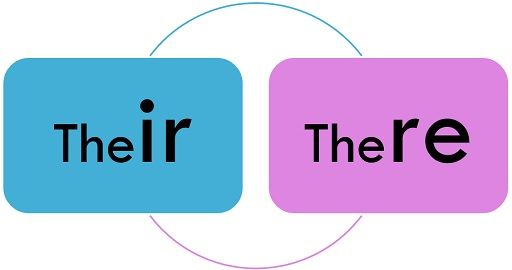
- There is a drawer in the almirah, where you can find all their stuff.
- Their teacher called me over there.
In these sentences, the word ‘there’ is indicating a place while ‘their’ is used to means ‘belonging to a group of people’. Take a read of this article to understand the difference between there and their.
Content: There Vs Their
- Comparison Chart
- Definition
- Key Differences
- Examples
- How to remember the difference
Comparison Chart
| Basis for Comparison | There | Their |
|---|---|---|
| Meaning | The word ‘there’ represents a place or it can also be used to refer something that exists. It also acts as an exclamation. | The word ‘their’ symbolizes belongingness or ownership of someone or something. |
| Pronunciation | ðɛː | ðɛː |
| Part of Speech | Noun, Pronoun, Adverb, Adjective, Interjection. | Possessive Determiner |
| Examples | There is a big mall. | Their fight remind me of my childhood. |
| You must go there for further studies. | Can you give me their number? | |
| There are certain bugs in the software. | The employees efforts can be seen in their performance. |
Definition of There
The word ‘there’ is used in different contexts, when used as different parts of speech in various sentences.
- When used as an adverb, it means in or at that place, a point in time, or a particular matter or seeking attention:
- I will be there on time.
- She was there to meet you.
- There he comes.
- I stopped there, to let him reach.
- It can also be used as an interjection to show a feeling of satisfaction or calling attention:
- There, I told your parents would get angry after knowing your result.
- It can be used as a pronoun to introduce the subject or to say that something exists or does not exist:
- There is someone at the door calling your name.
- There are some differences between management and administration.
- As an adjective to give emphasis:
- You can ask for the coupons for the volunteer there.
- The girl over there is very cute.
- As a noun it refers to the place:
- There you can find Robin.
- Can you reach there by 7 AM?
Definition of Their
Simply put, the word ‘their’ is used in sentences as an attributive adjective, followed by a noun. It expresses the possessive form of the word ‘they’ which is a plural pronoun. Now let’s discuss where to use their in our sentences:
- As a determiner to show belongingness:
- She returned them their basketball.
- The villagers live in their huts.
- You should stop intervening in their matters.
- It may also be used when the gender of the person is not known:
- Someone has stolen their phone.
- My friends parked their car in the parking lot.
The points given below are substantial so far as the difference between there and their is concerned:
- In English, there is used to express a place which is already mentioned or implied which is known to the other person. It may also be used to express a specific object or person. On the other hand, their is a possessive form of ‘they’, that signifies ownership of something by a group of people.
- Basically, there is used as an adverb of place or position, but it can also be used as a noun, pronoun, adjective, and interjection. As against, their is a possessive determiner, which refers to belongingness to someone or something.
- Example: There must be something wrong with their behaviour.
You are going there for their well being.
Examples
There
- There you go.
- There are some horses in the stable.
- Are you there?
Their
- Their suggestion actually helped me.
- Their happiness depends on their mood.
- I like their attitude.
How to remember the difference
The best way to remember the difference is that whenever you use there it either means a location or something that exists. On the other hand, you use their when you refer to a noun which it replaces.
The words there and their are often confused and misused because they are homophones (they sound alike). A good way to remember the difference between the there and their is to remember — Here with a T is there; so it refers to a place.
While «there» refers to a place, «their» means belonging to, or associated with, a group of people (e.g., «their clothes» — clothes that belonged to them).
Comparison chart
| |
Their | There |
|---|---|---|
| Meaning | Belonging to them | (in or to) that place |
| Used as a contraction | No | No |
| Parts of Speech | Possessive pronoun; sometimes used (mostly informally) as a replacement for singular possessive pronouns (his and her) when the gender of a person is unknown. | Noun, adverb, pronoun, adjective, interjection |
| Examples | (1) Their house was decorated for Halloween. (2) The dog was theirs. | (1) There was nothing left to do but go home. (2) She loved visiting there. (3) There he is! |
Examples of There vs. Their
- She envied their expensive shoes.
- I don’t want to go there because it’s too cold.
- Their van was destroyed in the accident.
- Once upon a time, there was a princess who turned into a frog.
In the following video, an English teacher explains the differences between their, there, and they’re with more examples.
Definitions
Their
«Their» is the possessive form of the plural pronoun they, used as an adjective preceding a noun (e.g., their company, their books on the shelves, their promotion to upper management).
Despite being plural, «their» has also come to be used as a replacement for the singular possessive pronouns his and her, as an indefinite singular antecedent (i.e., when the gender of a person is unknown or when referring to people in a mixed group or crowd).
- Someone parked their car in a towing zone.
- Does everyone have their ticket in hand?
This use of «their» is common in casual conversation and informal written English, but whether it is used in academic or professional writing often depends on style guide requirements, which typically prefer the more verbose «his or her» or alternating gendered pronouns.
- Someone parked his or her car in a towing zone.
There
«There» has multiple functions and can be used as an adverb, noun, pronoun, adjective, or interjection.
As an adverb, «there» can refer to in or that place, a moment in time or a point in a process, or a particular or specific matter. It can also call attention to a particular spot.
- My wife will be there soon. (referring to in or that place)
- She paused there to let him reply. (referring to a moment in time)
- I was right to be sad there. (referring to a specific matter)
- There he is! (calling attention)
As a noun, «there» refers to a state or condition.
- Once you get into college, you have to face it alone from there on.
As a pronoun, «there» replaces a noun where the verb comes before the subject or the subject is not mentioned. It can also supplant a place name or a specific time-based noun.
- There is no way to fail. (replacing a noun)
- She went there last week. (replacing a place name)
- We were there when that bell rang. (replacing a time-based noun)
As an adjective, «there» provides emphasis.
- See the lady there for directions.
As an interjection, «there» can express a variety of feelings and emotions, ranging from relief, satisfaction, and approval, to encouragement and consolation.
- There! We won!
- There, there, you’ll get them next time.
References
- There — definition and usage — Wiktionary
- Their — definition and usage — Wiktionary
- Follow
- Share
- Cite
- Authors
Share this comparison:
If you read this far, you should follow us:
«Their vs There.» Diffen.com. Diffen LLC, n.d. Web. 14 Apr 2023. < >
12 ноября 2019
Нет такого человека, который бы ни разу не ошибался. При написании слов мы можем просто опечататься и подумать «ой, ничего страшного». Но некоторые ошибки в словах меняют смысл всего предложения, потому что это уже будут другие слова! И сегодня мы с вами разберемся с такой популярной троицей, как their — there — they’re. Даже носители языка иногда допускают тут ошибки 
Итак, трио, состоящее из слов they’re, their и there, представляет собой яркий пример омофоничности, то есть одинакового звучания слов, имеющих разное значение и происхождение.
Their (их)
Their (их) является притяжательной формой местоимения they (они), и означает принадлежность:
- They left their keys in the office. – Они забыли свои (их) ключи в офисе.
Their (их) подразумевает множественное число, но всё чаще данная форма местоимения употребляется при местоимениях единственного числа, таких как his (его) или her (ее) после таких слов, как someone (кто-то), например:
- Someone left their cell phone on the table. – Кто-то забыл свой (их) телефон на столе.

There (там)
There представляет собой наречие места (там). В этом смысле there (там) является противопоставлением наречия here (здесь). И рассматриваемое наречие отвечает на вопрос «где», как в примере:
- He is there now. – Он сейчас там.
There также используется как местоимение, являющееся подлежащим в предложении, как в примере:
- There is still hope. – Есть (дословно: там есть) еще надежда.

They’re (они + форма глагола «to be»)
They’re представляет собой сокращение слов they и are.
- They’re improving their linguistic knowledge! – Они улучшают свои лингвистические знания!

Написание наших омофонов тоже содержит подсказку!
Если Вы вдруг поймете, что не знаете, какое из указанных слов употребить в конкретном случае, то всмотритесь в подсказку в их написании:
- Their (их) содержит в себе слово heir (наследник), которое намекает на то, что their означает принадлежность кому-то.
- There (там) содержит в себе слово here (здесь). И с помощью there мы говорим о конкретном месте (то есть выбираем между «там» и «здесь»).
- They’re имеет апостроф, указывающий на то, что это слово состоит из двух: they are. Если Вы сможете подставить they are в предложение, и его смысл останется прежним, тогда именно этот омофон (they are) и нужно использовать.
You are welcome and have a good day!
Все статьи
Подписывайтесь на наши обновления
В нашей рассылке отсутствует спам (да, мы тоже его не любим ). Присылаем секретные учебные материалы,
анонсы мероприятий и скидки на наши курсы. Не пропустите! Отписаться можно в любую секунду.
Despite sounding identical in their pronunciations, there, their, and they’re all have distinct meanings from one another. Words like these are called homophones. To, too, and two are examples of other homophones.
What is the Difference Between There, Their, and They’re?
In this post, I will go through the differences between these words and how to use them in your writing. I will use them in example sentences to demonstrate their meanings and uses. Plus, at the end I will give you a trick to remember the difference.
After reading this post, you shouldn’t ever again confuse there vs. their vs. they’re again.
When to Use There

- It is freezing up there in mountains.
- I found this dollar sitting over there on the sidewalk.
When to Use Their
What does their mean? “Their” is the possessive form of “they.” Being that their is possessive, it implies ownership over something. For example,
- Their names were called.
- All of their equipment was loaded into the truck.
In the first sentence it is their names that are being called. They belong to them. As is the case in the second example, the equipment also belongs to them, so we use “their.”
When to Use They’re

- They’re making a new Star Wars movie.
- They’re down three games to one.
It is essential that you remember that “they’re” is a contraction and not a possessive. The apostrophe in it is indicating a letter that is being left out.
If you are ever in doubt on whether or not to use “they’re,” just split it apart into two words. If it still makes sense, “they’re” is correct. If it doesn’t make sense, it will be a different form. Let’s try this with a few of our above examples,
- All of they are equipment was loading into the truck.
This sentence makes no sense when you substitute “there are” in for the their, so you know that “their” is the correct word. Let’s try another,
- It is freezing up they are in the mountains.
This sentence also makes no sense using “there are,” so we know that it isn’t the right word.
Tricks to Remember the Difference
As promised, here are a few good tricks that you can use to keep track of their vs. there vs. they’re.
There is
Their is usually followed by a noun. Their money, their parents, their iPod, etc. It also has the letter “I” in it and “I” possess things. I possess a car. I possess a computer.
They’re is a contraction standing for they are. To remember when to use this one, just split it up in the sentence and see if it still makes sense.
Summary
Is it there or their? Or is it there or they’re? As is usually the case, this all depends on the context of your sentence.
There is a directional word.
Their a possessive word.
They’re is a contraction for the words “they are.”
Contents
- 1 What is the Difference Between There, Their, and They’re?
- 2 When to Use There
- 3 When to Use Their
- 4 When to Use They’re
- 5 Tricks to Remember the Difference
- 6 Summary
There vs. their is one of the most common linguistic bar fights in the English language. The two words are pronounced exactly the same way and are nearly doppelgängers in the looks department. Yet despite the many similarities, their and there could not be more different. To break up the tussle, it’s important to understand what these semantic sluggers mean and when it is appropriate to use them. Let’s get ready to rumble.
When to Use There vs. Their
When trying to decide between there vs. their, the first thing to remember is that the word there refers to a location and can be used is several different ways. There can be used as an adverb to mean the opposite of “here.” For example:
- Can I park there?
- That weird sound is coming from over there.
- Put that down, and step over there.
There can be used as a noun meaning “that place.” For example:
- After looking at the spooky forest, Dave told us he’d never go in there.
- We were hanging out at the volcano, but when the ground started shaking, we got out of there.
- The farmers’ market looks great, but before we go in there, we need to set some ground rules.
There can be used as an adjective to stress which subject or object is being referred to. For example:
- Pass me the apple. No, that one there. Thanks.
- I usually like penguins, but that one there was the meanest.
- That person there was the one with the weird hat!
There can also be used as a pronoun to introduce a noun or phrase. For example:
- There are barely any pandas at this water park.
- Is there a waffle on the menu?
- I could have sworn there was a secret passageway in this house.
When to Use Their vs. There
While there refers to a location and has many uses, their is just a third person plural possessive adjective meant to establish belonging or ownership, and it’s typically followed by a noun. Here are some examples:
- That improv troupe was funny, but their musical abilities were severely lacking.
- I hope you like my parents—because we’re going to see their art show tonight.
- Those cookies are for the band. They’re not yours; they’re theirs!
Can’t They All Just Get Along?
Despite the identical pronunciations and similar aesthetic, their vs. there is an easy puzzle to solve once you understand what each word means. While there is used to denote location, their is used to define belonging and ownership. And although the two words are often found duking it out, they can coexist peacefully if used correctly. To prove it, here are some examples of them getting along in the wild.
- There are actually people out there who eat spaghetti with their hands.
- My friends went to that abandoned mine over there, but now they can’t find their car.
- I can’t believe those dolphins left their hacky sacks way back there in the lagoon.
There! Now you know the difference between there and their. And don’t forget to check out some of Elite Editing’s other blogs on distinguishing between similar words, such as biennial vs. biannual, affect vs. effect, and caramel vs. Carmel.
YOU MIGHT ALSO LIKE
Grammar 101: Principle vs Principal
“Principal” and “principle” are two similar terms that are very easy to confuse, and even experienced writers sometimes mix the two words up. In this…
What Is a Compound Word?
Scientists are big into molecular compounds, and there is something kind of magical about them. You can start with a couple of atoms of…



